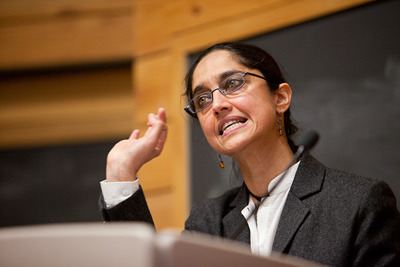Leela Gandhi speaks on postcolonial ethics in first Humanities Lecture
By Daniel Aloi

Leela Gandhi discussed a range of approaches to ethics in relation to colonialism March 30 in Goldwin Smith Hall's Lewis Auditorium.
Gandhi, a professor of English at the University of Chicago, delivered the inaugural talk in the College of Arts and Sciences' Humanities Lecture Series. She contributes to the field of postcolonial theory and posits new possibilities for what she calls, following her great-grandfather Mohandas K. Gandhi, "nonviolent historiography."
Her one-hour talk, "Notes Toward a Postcolonial Ethics," focused on the years between 1900 and 1955 and areas including ethical socialism, newness, sovereignty, the crisis of modernism and anti-imperialism. She also engaged audience members in discussion after her talk.
"Allies and detractors both agree that ethics is central to postcolonial thought," she said, later contending that "ethical socialism -- work on the self -- is a direct descendant of anarchical socialism."
Gandhi said in an interview that she was invited to campus to "give an account of what I was currently working on, but in a way that was not bound to any particular discipline -- to speak to the humanities at large. ... I really belong to the humanities proper, so I'm really interested in the philosophical and theoretical positions one can make in relation to imperialism."
Gandhi is a co-founder of the Journal of Postcolonial Studies; her works include "Postcolonial Theory and England Through Colonial Eyes in Twentieth-Century Fiction."
Theatre, Film and Dance chair Amy Villarejo has called Gandhi "one of the most extraordinary thinkers and educators of her generation." Villarejo said she nominated Gandhi for the lecture series after meeting her during the School of Criticism and Theory 2009 summer session at Cornell, where Gandhi led a well-received seminar on anti-colonial metaphysics, in which she assigned a variety of texts to a group of graduate students from diverse backgrounds.
The new lecture series features emerging leaders in humanities fields, including theorists like Gandhi whose work spans disciplines.
"This series is a fantastic opportunity to enhance our discussion of the humanities," said Peter Lepage, the Harold Tanner Dean of the College of Arts and Sciences. Speakers in the series are nominated by humanities department chairs and chosen by consensus of the chairs, he said.
The next speakers in the series are Peter Adamson, professor of ancient and medieval philosophy at King's College London, April 13; and Charlotte Fonrobert, a Stanford University associate professor of Judaism, May 4.
Get Cornell news delivered right to your inbox.
Subscribe